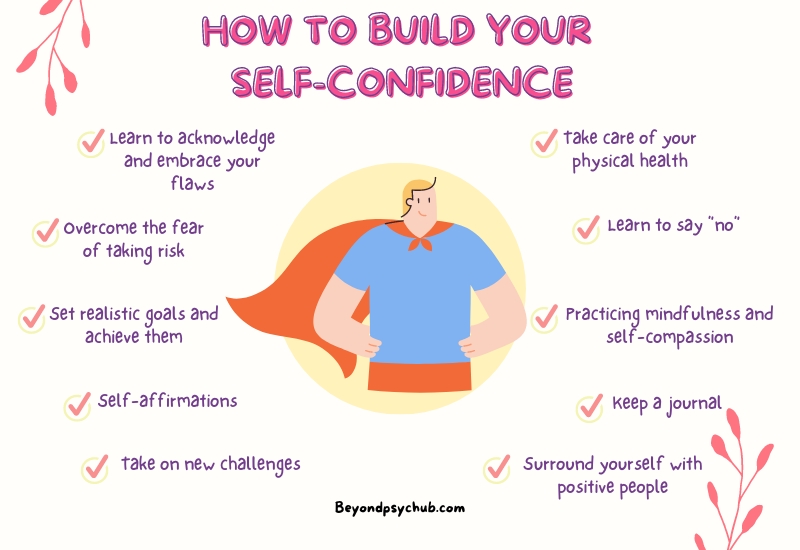- What is Self-Confidence?
- Characteristics of a Self-confident Person
- How To Build Your Self-Confidence?
- 1. Learn to Acknowledge and Embrace Your Flaws
- 2. Overcome the Fear of Taking Risk
- 3. Set Realistic Goals and Achieve Them
- 4. Self-affirmations
- 5. Take on New Challenges
- 6. Take Care of Your Physical Health
- 7. Learn to Say “No”
- 8. Practicing Mindfulness and Self-compassion
- 9. Keep a Journal
- 10. Surround Yourself with Positive People
Because one believes in oneself, one doesn’t try to convince others.
Because one is content with oneself, one doesn’t need others’ approval.
Because one accepts oneself, the whole world accepts him or her.
Lao Tzu
What is Self-Confidence?
Self-Confidence is the key ingredient to have a successful life. it refers to an individual’s ability to believe in their own skills, abilities, and judgment. Self-confidence allows individuals to take risks and pursue their goals without fear of failure. People who have high self-confidence tend to have positive self-esteem and feel good about themselves. They tend to be optimistic and resilient, and they tend to be more successful in their personal and professional lives.
On the other hand, people who have low self-confidence tend to doubt their abilities and may struggle in almost all aspects of one’s life whether it’s career, relationship, on life in general. Low self-confidence can cause us to doubt ourselves, limiting our potential and preventing us from taking risks and trying new things. It can also lead to feelings of anxiety and depression, as well as problems with self-esteem.
Characteristics of a Self-confident Person
A confident person typically exhibits a number of characteristics, including:
- They have an optimistic attitude towards life and themselves.
- They have a strong sense of self-worth and are comfortable with the decisions they make.
- They are able to acknowledge their mistakes and learn from them, rather than becoming overwhelmed by them.
- Self-confident people also tend to be assertive, capable of expressing their opinions and ideas in a way that is not overly aggressive.
- Self-confident people don’t let outside criticism deviate from their goal.
- Finally, confident people are resilient, with the ability to cope with difficulties and setbacks in a healthy manner.

How To Build Your Self-Confidence?
The vast majority of people struggle with low levels of self-confidence. It’s a condition that has a seriously impact all the aspect of everyday life. Building self-confidence requires changing your beliefs about yourself, which will require effort. “No one can improve their quality of life if they do not believe they are capable of doing it.” Here are a few tips to build self-confidence.
1. Learn to Acknowledge and Embrace Your Flaws
The most important step in building self-confidence is to look inward, identify our flaws, and acknowledge them. Remember, nobody is perfect, and striving for perfection may be a major source of stress and self-doubt. We should avoid comparing ourselves to others and instead focus on our positive characteristics and strengths.
2. Overcome the Fear of Taking Risk
Fear holds us back from taking new opportunities and reaching our full potential. We can build our self-confidence by learning to overcome our fears and take risks. Taking risks can also include stepping out of our comfort zones and trying new activities or experiences. This can be done by gradually facing our fears, learning coping strategies, and seeking help if needed.
3. Set Realistic Goals and Achieve Them
When we set realistic goals for ourselves, we are taking control of our lives and actively working towards something that we want to achieve. When we set a goal and achieve it, our brain releases dopamine, a chemical that makes us feel good. Achieving these goals can give us a sense of accomplishment and pride, which can in turn boost our self-confidence. Setting small, attainable goals can be a good way to start. This could be something as simple as making your bed every morning or going for a walk every day. As we achieve these goals, we can gradually work towards larger, more ambitious ones.
4. Self-affirmations
One of the most effective ways to build self-confidence is through the practice of positive self-talk. This involves actively choosing to focus on positive thoughts and beliefs about oneself rather than dwelling on negative thoughts and self-criticisms. Positive self-talk can help increase self-esteem, mood, motivation, and determination.It can be practiced through affirmations, visualization, and by replacing negative thoughts with positive ones.
One of the biggest enemies of self-confidence is negative self-talk. This is the constant stream of negative thoughts that run through our heads, such as “I’m not good enough,” “I’ll never be able to do that,” or “I always screw things up.”
To build self-confidence, it’s important to learn how to replace these negative thoughts with positive ones. One way to do this is to practice positive self-talk. This means consciously making an effort to speak kindly and positively to yourself, just as you would to a friend. Some examples of positive self-talk include “I am confident and capable”,”I trust in my abilities”. “I can handle anything that comes my way,” and “I am strong and resilient.”
These are positive statements that we tell ourselves to promote self-confidence. When we repeat these affirmations to ourselves, we are reprogramming our thoughts and beliefs about ourselves.
5. Take on New Challenges
Taking on new challenges can be a great way to build self-confidence. When we accomplish something that we previously thought was impossible, it can give us a sense of accomplishment and boost our self-confidence. Examples of new challenges include:
- Learning a new skill or hobby
- Trying a new sport or activity
- Taking on a leadership role at work or in your community
- Traveling to a new place
- Starting a new job or business
By taking on new challenges and pushing ourselves out of our comfort zones, we can learn to trust in our abilities and become more confident in ourselves.
6. Take Care of Your Physical Health
Our physical health and our self-confidence are closely linked. When we don’t feel good physically, our self-confidence can take a hit. On the other hand, when we take care of our physical health, our self-confidence can soar. Exercise can also be a great way to relieve stress, boost energy levels, and improve mood. To build self-confidence, make sure you are getting enough sleep, eating a healthy diet, and getting regular exercise. These simple steps can make a big difference in how you feel and how confident you are.
7. Learn to Say “No”
One of the biggest barriers to self-confidence is feeling like we have to say “yes” to everything. When we say “yes” to everything, we can quickly become overwhelmed and stressed. This can lead to feelings of inadequacy and low self-confidence. To build self-confidence, it’s important to learn how to say “no” when necessary. This means setting boundaries and being assertive. It’s okay to say “no” when you don’t have the time or energy for something, or when you don’t feel comfortable doing it.
8. Practicing Mindfulness and Self-compassion
Mindfulness is the practice of being present and fully engaged at the moment, without judgment. This can help us to be more aware of our thoughts and feelings, and to let go of negative self-talk. Self-compassion involves treating ourselves with kindness and understanding, rather than being overly critical or harsh. When we practice mindfulness and self-compassion, we are more likely to be kind and compassionate to ourselves, which can lead to improved self-confidence.
9. Keep a Journal
Writing down your thoughts and feelings can help you understand them better and gain a new perspective. We can also use a journal to track your progress and celebrate your successes. This can be a powerful reminder of how far you’ve come and how much we’ve accomplished, which can boost our self-confidence.
10. Surround Yourself with Positive People
The people we surround ourselves with can have a big impact on our self-confidence. If we are constantly around negative people who bring us down, our self-confidence will suffer. On the other hand, our self-confidence will flourish if we surround ourselves with positive people who lift us up and support us . This can be especially helpful when we are facing difficult situations or challenges, as having someone to turn to for support can give us the strength and motivation to keep going.
So, make an effort to spend time with people who are positive and supportive, who believe in us, care for us, and encourage us and make us feel more secure and valued and limit your time with those who bring you down. Building a support system can include family, friends, mentors, or even joining support groups.
.















